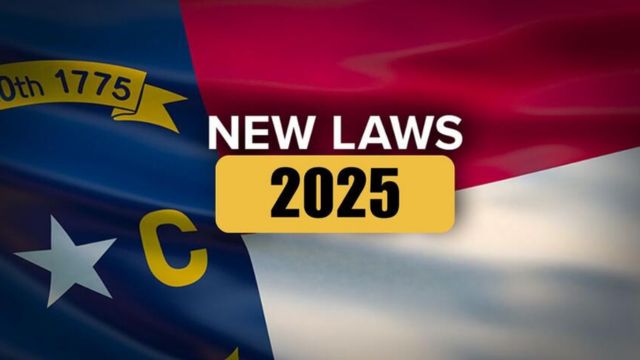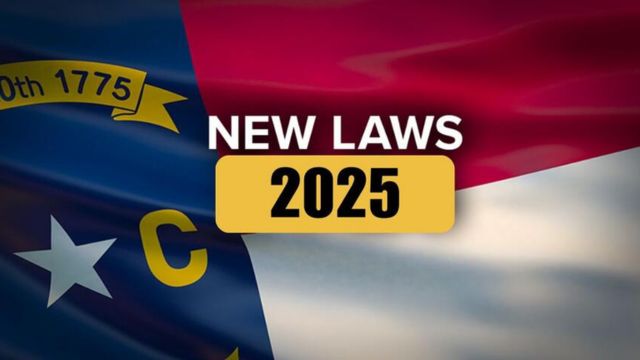Aiexpress – New legislation will go into force in North Carolina on January 1st, the first day of the new year. If saving more money is one of your New Year’s resolutions, a new law will make it easier.
A few of the new legislation and policy changes that will take effect in North Carolina on New Year’s Day 2025 are listed below.
Law Strips NC’s Powerful Leaders
Senate Bill 382 The bill, which is very contentious, gives Helene money. Additionally, it deprives State Superintendent Maurice Green, Attorney General Jeff Jackson, and incoming Governor Josh Stein of their authority.
Governor Cooper vetoed the bill, but it will become law if the NC GOP supermajority overrides the veto. Roy Cooper, the outgoing governor, and Josh Stein, the next governor, sued the bill.
Income Tax Reduction
Bill 259 in House Your wallet gets bigger thanks to a new tax law. Generally speaking, you don’t hear positive things about tax laws. But for those who are frugal, this law is welcome, as it goes into effect in January.
Individual income tax rates will drop from 4.5% in 2024 to 4.25% in 2025 under the law included in North Carolina’s 2023 budget bill. Each year, taxpayers will see more decreases. By 2026, the income tax rate will have decreased to 3.99%. There will be modifications to North Carolina’s corporate income tax as well.
Modifications to Auto Insurance
Senate Bill 452 changes the state’s auto insurance legislation in a number of ways. The minimum liability limits for motor insurance will rise to $50,000 for a single person and $100,000 for two or more people per accident under the new law. Additionally, property damage coverage will increase to $50,000.
Additionally, SB 452 modifies the underinsured motorist coverage calculation to take into account the entire damages incurred by a person. The goal of these improvements is to give drivers and accident victims more financial protection.
Who is considered a juvenile?
HB 834 becomes operative in June 2024. In particular, this amendment includes new modifications to the court transfer procedure and changes the definition of a delinquent adolescent under North Carolina law. Any juvenile who violates state or municipal law and is between the ages of 10 and 16 will henceforth be considered a delinquent juvenile.
This classification also applies to juveniles between the ages of 16 and 18, with the exception of offenses that are already listed elsewhere in state law and offenses that, if committed by an adult, may be classified as Class A, B1, B2, C, D, or E felonies.

Juveniles who commit specific felonies between the ages of 8 and 10 are likewise considered delinquents under the law.
Cost of Tickets and Live Performances
Senate Bill 607: At the beginning of the ticket purchasing process, ticket sellers, such as venues, promoters, and resale websites, must show the entire ticket price, including any required fees. Sellers are not permitted to raise the original price while a customer is shopping, with the exception of certain permitted costs like government taxes and delivery fees.
All live entertainment events in North Carolina, including concerts, athletic events, and theatrical productions, are subject to the law, which was passed in order to minimize unexpected fees and expenditures that frequently surface late in the checkout process. Violations of the state’s unfair trade practices statute will result in penalties.
The NC Attorney General’s office is also empowered by the statute to look into complaints and implement the new regulations.
Health Insurance for State Workers
House Bill 1020: A new administrator will oversee health insurance for state employees and retirees following decades of coverage by Blue Cross NC. North Carolina’s State Health Plan is currently administered by Aetna as a third-party. This covers educators, public servants, retirees, and their dependents.
Their network of providers will be affected by the coverage. Initially contesting the state’s choice to move to Aetna, Blue Cross NC withdrew its lawsuit after a judge upheld the change.
Limits on Campaign Contributions Are Raised
Beginning on January 1, North Carolina political parties and candidates will be able to contribute up to $6,800 every election, an increase of $400. In any election, a candidate committee or political committee may not receive more than $6,800 from any one person or political organization.
The contribution cap is subject to exceptions. Contributions to a candidate’s or spouse’s committee and to any national, state, district, or county executive committee of any political party recognized under the definition of “political party” are, for instance, unlimited; the formation of a new party (N.C.G.S. 163-96) is exempt from contribution restrictions.













Leave a Reply